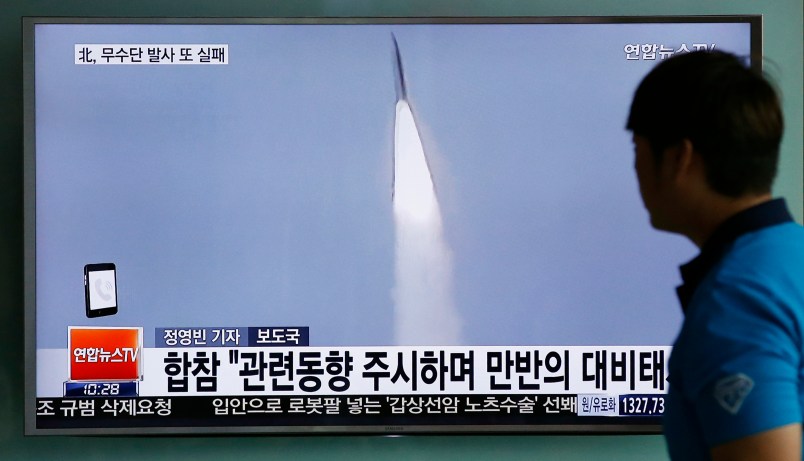SEOUL, South Korea (AP) — A North Korean missile launch likely failed on Tuesday, South Korea’s military said, the fourth in a series of high-profile failures that somewhat temper recent worries that the North is pushing quickly toward its goal of a nuclear-tipped missile that can reach America’s mainland.
South Korea’s Yonhap news agency said the missile was a powerful mid-range Musudan, which could potentially reach U.S. military bases in Asia and the Pacific.
Yonhap cited an unidentified government source as saying the missile exploded at a mobile launch pad as soon as the launch button was pressed. The report, if confirmed, suggests the missile may have even failed to lift off. Yonhap did not say how its source obtained the information.
South Korea’s military couldn’t confirm the report. The Joint Chiefs of Staff said in a statement that North Korea attempted to launch an unidentified missile early in the morning from the eastern coastal town of Wonsan, but that it likely failed. It released no other details.
Despite the recent failures, there have been growing worries about North Korea’s nuclear and missile activities this year, which include a nuclear test in January and a rocket launch in February that outsiders saw as a test of banned long-range missile technology.
North Korean leader Kim Jong Un issued an order in March that tests be conducted of a nuclear warhead and ballistic missiles capable of carrying such warheads. The order was thought to be part of North Korea’s response to annual South Korea-U.S. military drills that it sees as a rehearsal for an invasion.
“I think they keep firing (Musudans) because they’ve continuously failed” in previous launches, said Lim Eul Chul, a North Korea expert at South Korea’s Kyungnam University. “They’ll continue to make efforts to upgrade (Musudan’s) capability to a level that can satisfy their leader.”
South Korea has dismissed as “propaganda” repeated overtures by North Korea for talks, which some analysts see as an attempt by the North to win concessions from its rivals. South Korea’s Foreign Ministry warned Tuesday that North Korea will face stronger sanctions if it doesn’t stop provocations.
Lim said Tuesday’s launch attempt shows that North Korea is openly pressing ahead with its vow to bolster its military strength, regardless of whether it is pushing for talks with South Korea. “For them, upgrading Musudan’s capability is a different matter from seeking a dialogue with South Korea,” he said.
In April, North Korea attempted unsuccessfully to launch three suspected Musudan missiles. All exploded in mid-air or crashed, according to South Korean defense officials.
Musudan missiles are thought to have a potential range of about 3,500 kilometers (2,180 miles), which would put U.S. military bases in Guam within their striking distance. South Korea believes North Korea does not have a functional long-range missile capable of hitting the U.S. mainland, but that the North is working on that technology.
Before April’s suspected launches, North Korea had never flight-tested a Musudan missile, although one was displayed during a military parade in 2010 in Pyongyang, its capital.
___
Associated Press writer Kim Tong-hyung contributed to this report.
Copyright 2016 The Associated Press. All rights reserved. This material may not be published, broadcast, rewritten or redistributed.







North Korea and Trump have a lot in common.
Megalomaniacal, blustering, and outrageous conduct masking inner weakness, unprincipled, dishonorable, and fraudulent behavior.
North Korea’s missile testing, and China’s increasing aggression over its claims to the South China Sea, are also driving Vietnam closer to the US.
Last week the US lifted its longtime arms embargo against Vietnam, and a recent agreement will allow US Navy ships to enter its main port. According to a recent report in Reuters, “the U.S. Navy may get a long-held wish to use Cam Ranh Bay, the best natural harbor in the South China Sea, military sources say.”
Vietnam is also anticipated to be a major beneficiary of the Trans-Pacific Partnership (TPP) if that trade agreement is ratified.
Why do the Norks hate the Sea of Japan?
More spray tan please.